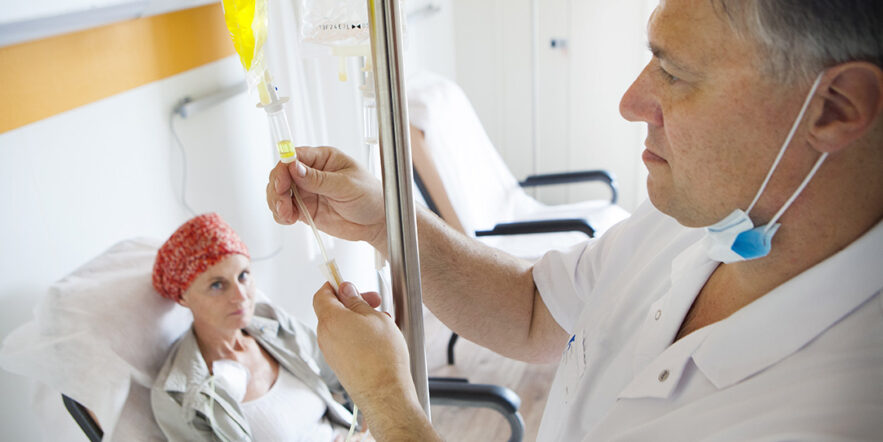If your chemotherapy cancer drugs are making you feel miserable, you might be able to have your dose lowered without it losing effectiveness.
The dose makes the poison, noted the Swiss chemist Paracelsus more than 500 years ago. For example, you could take two acetaminophen pills (Tylenol) for a headache and get good relief, or you could take 20 of them and end up in the hospital, having poisoned yourself and harmed your kidneys. Or you might simply drink two glasses of water, take a walk and then notice that your headache has gone away without taking any medicine.
The popular cancer treatment chemotherapy operates like a machine gun, aiming at any cell that grows quickly. When cancer cells are fast-growing and aggressive, chemo can be the best and only life-saving option. However, the drugs cannot decipher the difference between the healthy cells that we need to live and the cancer cells that are harming us. Chemo drugs attack any fast-growing cell. The normal cells that are the most likely to be damaged by chemo drugs (because they are fast-growing) are hair follicles, bone marrow cells and cells in the mouth, digestive tract and the reproductive system. Over time, chemo drugs can damage lung tissue, the heart and kidneys, harm nerves (losing the sense of touch in fingers and toes) and cause infertility. And they can cause a second cancer.
In addition, chemo drugs are infamous for their severe side effects. One only has to see a woman with a bald head to think breast cancer. In addition to hair loss, a suppressed appetite, exhaustion, nausea and constipation are common side effects of chemo.
With those side effects in mind, what about a patient taking a smaller dosage of the chemo drug, so that they doesn’t feel as bad afterward? That’s a question the Food and Drug Administration (FDA) is asking now.
All drugs, except for cancer drugs, are tested at various doses to reach that balance of the least needed to be effective. Remember the acetaminophen example: take too much of nearly any medicine, you’ll likely end up in the hospital with the side effects being so much worse than the original headache. Yet chemotherapy drugs are not tested for lower doses. Chemotherapy drugs are tested for the highest tolerated dose.
That is about to change. The FDA is now directing pharmaceutical companies to test a variety of dosages of all cancer drugs in order to find the lowest effective dose to minimize the side effects and the adverse effects on your body’s systems.
You don’t have to wait for clinical studies and trials to be reported; you can talk to your doctor now. If you are prescribed a chemotherapy drug, ask about the side effects and what the damage could be to your organs. Ask if you can start at a lower dose and only increase it if needed. If you’re on a chemo drug now, ask your doctor if you can try a lower dose to preserve your organs and maintain a better quality of life.
Talking With Your Doctor About Side Effects Works
Patients who spoke with their doctors about the side effects of their treatment for metastatic breast cancer were often able to lower the dosage. Doctors reduced the drug dose for 66% of those patients who reported side effects, according to a 2021 survey by The Right Dose, a patient advocacy group for those with metastatic breast cancer. Eighty-three percent of patients whose dosage was lowered reported feeling better (at least, initially); 64% only needed one dosage reduction to feel better; 28% required two reductions; and 8% found relief after three.
The study did not include if the lower dosage had any effect on Progression Free Survival and Overall Survival (the usual measurements of cancer drug effectiveness). However, the organization supplied me with several studies (listed below) showing lower dosing of certain cancer drugs don’t affect efficacy and do increase quality of life. This is a conversation to have with your medical team.
Drug Doses for Any Illness Can Be Lowered
If you’re taking medicine for any illness and that medicine is stressing your body, talk with your doctor. Often the dosage can be lowered. A lower dosage may result in you having fewer or less-severe side effects. In many cases, there may be alternative medicines that work well in the body and produce fewer side effects.
Selected Studies of Variable Doses of Cancer Drugs
Reduced Palbociclib Dose Associated With Lower Rate of Neutropenia in HR+ Metastatic Breast Cancer
Efficacy of Very-Low-Dose Capecitabine in Metastatic Breast Cancer






